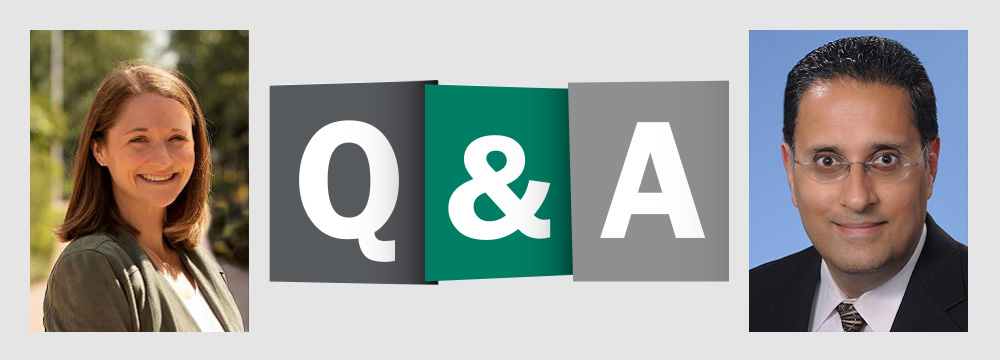
Intervening on interruptions
Hospitalists should take steps to mitigate the effects of interruptions on their work, researchers say.
It's inevitable that hospitalists will be interrupted, and often, but that doesn't mean there's nothing to be done about the consequences, according to a recent paper.
Experts in the psychology of interruptions and medical diagnosis recently collaborated to offer strategies for reducing the negative effects of interruptions during diagnostic decision making. Their paper, published Jan. 25 by the Journal of General Internal Medicine, made recommendations for clinicians, researchers, and health system leaders.
ACP Hospitalist recently spoke to first author Jennifer F. Sloane, PhD, a postdoctoral fellow at the Center for Innovations in Quality, Effectiveness and Safety at the Michael E. DeBakey VA Medical Center and Baylor College of Medicine in Houston, and coauthor Hardeep Singh, MD, MPH, co-chief of the health policy, quality, and informatics program at the center.
Q: Why is it important to consider interruptions in hospital care?
A: Dr. Sloane: We can all agree that interruptions are prevalent in our daily lives, right? It doesn't matter who you are, where you live, what you do, you're going to be interrupted several times throughout the day. But I think it's important in particular to think about occupations and environments, such as hospitals, where interruptions can have very serious and fatal consequences.
Dr. Singh: In terms of safety consequences, previous work has mostly focused on interruptions during tasks such as ordering or administering a medication, but for clinicians who do a lot of thinking in terms of diagnosis and treatment decisions, the effects of interruptions have been less studied. So, we think this is certainly an important research area. Despite this being such a common event, we don't really know the outcomes.
Dr. Sloane: In hospital settings, specifically, these negative effects can lead to delayed or missed diagnoses. But something that's less studied is the negative effects that it can have on the decision maker, the actual clinician. Coming from a cognitive psychology background, I'm always thinking of things like cognitive load and what impact that is having on your well-being. Clinicians already have to juggle so many tasks and responsibilities, and then having to deal with interruptions and distractions on top of that can lead to increased stress, anxiety, and even burnout.
Q: How feasible is it to prevent or mitigate interruptions?
A: Dr. Sloane: We really tried in our paper to emphasize this distinction between prevention and mitigation. Dr. Singh brought up medication administration. In that situation, it makes sense to try to prevent interruptions at all costs, but for other situations it's not realistic or safe to prevent interruptions altogether. So, we need to research strategies that focus on methods to both prevent and minimize the effects of interruptions. In medication administration, there is some research on prevention strategies, like no interruption zones or “do-not-disturb” vests. While there are some positive effects, there can be some unintended consequences that come out of it.
Dr. Singh: I really think prevention is a two-way street—minimize interruptions when possible and prevent their safety consequences when they occur. People who interrupt could think about some of these things, too. For instance, when we are making rounds in the hospital with residents, in the midst of all the cognitive thinking, we're often getting interrupted frequently. Not just by interpersonal communication but also via interruptions in the electronic health record, such as pop-up alerts or notifications. Many of these are important, but several of them I really don't need to know and they are often just FYIs. Think of some of the email and text messages that we get—thank yous, reply-alls. There are so many ways we can change our behavior. We also need to study the behavior of communicating, so we can communicate, ideally, just the right signal at the right time, and not overload the other person.
Dr. Sloane: One paper that we cited reports findings from a quality improvement project, where they did a training intervention to help classify different levels of urgency in terms of when you should interrupt clinicians. For example, is the interruption nonurgent, emergent, or urgent? The whole idea is just that before you send a text or before you call someone, you really need to take a moment to think about what is the urgency of this task? Do you need a response before the end of the day, or do you need a response within one hour, or do you need a response immediately? There's a lot of potential benefits to making changes like this. But making any change at a system level is a really challenging task.
Q: Are there changes individual clinicians can make to reduce the effect of interruptions?
A: Dr. Sloane: Thinking about the strategies that we mentioned in our paper, a few stand out to me. First, trying to better manage your mobile devices, and having some sort of alert management system. Checklists are another popular strategy. There's quite a lot of research on checklists, but there is a lot of mixed evidence—some papers find that the checklists improved performance, but sometimes they don't. So, it's really important that you think about the type of checklist and test it out in your specific environment to make sure it is effective at reducing interruptions or mitigating the negative effects of interruptions.
This one's common sense, but people overlook it sometimes, so it's worth mentioning: taking a moment to prepare. Too often people get interrupted, and they think, “I need to stop what I'm doing; I need to address this right away.” Sometimes that is true, but in a lot of situations, you will have a few seconds to either jot down a note, or if you're on your computer, you can highlight something. The idea is to just give yourself some visual cue to help you remember where you left off. There's also a lot of research that shows people often don't resume tasks after being interrupted. Not only have you not completed the task, but you don't even remember the task, and you can imagine how dangerous that can be in health care.
Q: Are there also systemic strategies that could be helpful?
A: Dr. Sloane: One example is interventions to manage mobile devices and alerts through some sort of triage system. One of the days when I was shadowing [as a postdoctoral student], I saw some of the residents and clinicians were wearing these white pagers. I had a conversation at the end of the day with one of the hospitalists, and I asked, “How do you know if you need to answer the page immediately?” She said, “You always have to answer it because there's no way to monitor the urgency of it.” That is concerning to me. If you have no way to triage the urgency of that interruption, that leads to lots of distractions, and it takes time and may be hard to get back on task.
Dr. Singh: I agree. I'll give an example. Some of the time in the middle of rounds where we are doing all the cognitive thinking should be protected. If I were a health system leader, I would think “Can we carve out some protected time to minimize all nonurgent interruptions, say between 9 and 10 in the morning?” But we also have to consider the culture in medicine, that the general expectation is that we've got to do everything immediately, soon, or stat.
Dr. Sloane: Just to add on to that, thinking about EHR systems—that is one area where clinicians, IT personnel, and the developers really need to come together and sit down and think about is it really necessary to have all of these alerts?
Q: Do you have any other advice for hospitalists about dealing with interruptions?
A: Dr. Sloane: Perhaps this is also a bit of common sense, but not all interruptions will be disruptive. Interruptions that are likely to be disruptive will be interruptions that have a longer duration or interruptions that are similar to whatever task you're currently doing. So, if you're trying to write a prescription for a patient and then a nurse interrupts you and asks about another patient's medication for a similar condition, that can be disruptive and can lead to making an error on your current patient's prescription.
Also, the complexity of the interruption—during my PhD, I designed an experimental task with different levels of difficulty and interrupted participants throughout the task. We found that being interrupted on very easy tasks didn't hurt performance, but as the task got harder and harder, we started to see more errors. We also found that preparing for an upcoming interruption by taking a few seconds to think about where you are and what you're doing, a strategy known as an interruption lag, improved performance. Before [dealing with] the interruption, you think, “OK, what am I doing right now,” and after the interruption you can take another moment to think, “OK, wait, I have just been interrupted. What was I doing?” And make sure to get back to where you left off. This is a simple strategy that only takes a few seconds to implement.



